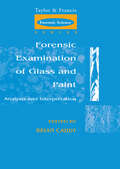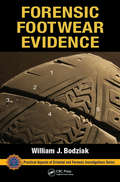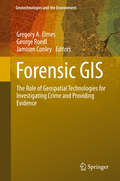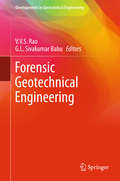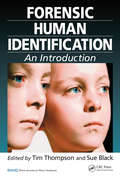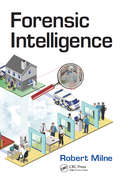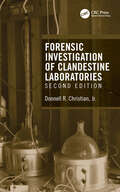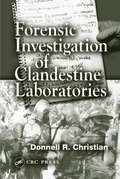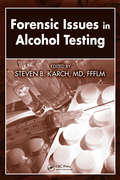- Table View
- List View
Forensic Examination of Fibres (International Forensic Science and Investigation)
by James Robertson Claude Roux Kenneth G. WigginsIn order for forensic fibre examiners to fully utilize fibre and textile evidence during their analysis, they require not only specialised forensic knowledge but also in-depth knowledge of fibres, yarns and fabrics themselves. Production, both the chemical and physical structure, and the properties of these materials is required in order to determine the value of fibre evidence. This includes knowing production figures, fashion changes, sudden arrivals of new materials, dye variability, and numerous other factors that may have a bearing on the information obtained. Fully updated with the latest advances, Forensic Examination of Fibres, Third Edition continues in the tradition of the First (1992) and Second Editions (1999) as the premier text on the subject of forensic fibre analysis. The international team of contributing authors detail the recovery of the evidence—through the different stages of laboratory examination—to the evaluation of the meaning of findings. The coverage has been considerably expanded, and all material, has been revised and wholly updated. Topics covered include examining damaged textiles, infrared microspectroscopy and thin layer chomatography, and colour analyses. This edition also highlights the critical role of quality assurance in ensuring the reliability of the technical observations and results, and, in doing so, looks at the implications of supervisory managers and labs in the accurate and responsible analysis of such evidence. Features include: Outlining evidentiary process from collecting and preserving the evidence at the crime scene through the laboratory analysis of fibres Detailing the latest developments and emerging technologies including Kevlar and other such advances in fibre technology Coverage of a broad array of fibres both, natural (cellulose, protein, and mineral) and man-made fibres including synthetic, inorganic and regenerated Forensic Examination of Fibres, Third Edition is a much-needed update to the classic book, serving as an indispensable reference to crime scene technicians, laboratory forensic scientists and microscopists, students in police, forensic, and justice science programs.
Forensic Examination of Glass and Paint: Analysis and Interpretation
by Brian CaddyThis volume represents an approach to the analysis of glass and paint as they occur as trace evidence in forensic cases. Each chapter is written by an expert in their particular area. The book is divided into two sections: one referring to paint and one referring to glass. Each section covers an introduction to the composition of these materials an
Forensic Examination of Hair (International Forensic Science and Investigation)
by James RobertsonThe examination of human hairs in the forensic science setting is a highly specialist forensic discipline. To date the topic has not been covered in a single volume in which all aspects of hair examination are brought together. In this volume an international group of authors have dealt with all aspects of the examination of human hair. The volume opens with the basic foundation accidence covering the physiology, growth and structure of hair. Forensic specific aspects of hair structure are then dealt with and a protocol for examination is presented. The remaining chapters deal with non microscopy approaches to hair examination covering historical and contemporary knowledge. These chapters include biochemical approaches to hair examination,
Forensic Facial Reconstruction
by Caroline WilkinsonThis book's major contributions include a detailed description of the Manchester method of facial reconstruction, using all the available published data on tissue depths and variation with age, sex, stature and ethnic origin. Caroline Wilkinson also includes an evaluation of the methods and problems associated with reconstructing the faces of children. Forensic facial reconstruction reproduces an individual's face from skeletal remains. Used when identification is otherwise impossible, it can give a name to the dead in forensic cases, or in archaeological contexts, provide a tangible impression of real individuals from our past.
Forensic Firearms in Criminal Trials: Legal, Investigative, and Scientific Aspects
by J. K. SinhaOver the last two‑plus decades, the scientific validity of the principles that underpin identifying a firearm from recovered fired ammunition has been a core issue for the admissibility of expert evidence in criminal trials in the United States. The issues that dominated the determinative points, as they related to the scientific and technological analysis, centered around the following: the validity of uniqueness of firearms, subjective methodology, the potential rate of error, unknown statistical certainty and unsatisfactory proficiency tests. These issues have essentially become the legal requirement for admissibility of experts’ opinion on the linkage of firearms with fired ammunition, an important forensic opinion that connects the crime with the perpetrator through the weapon of offence.In Forensic Firearms in Criminal Trials: Legal, Investigative, and Scientific Aspects, internationally renowned forensic firearm expert Dr J. K. Sinha provides demonstrative explanations and helpful clarifications using simple illustrative examples from scientific casework and everyday life. The goals are to: Prove the scientific validity of the uniqueness of identifying features of firearms Identify the statistical threshold to qualify and determine a corresponding match Debunk the misconception of subjective methodology and the potential rate of error thereof in experts’ decision making and opinions Clarify the prevailing perception of similar, dissimilar and insufficient marks and consequential interpretation With certain non‑technical readers in mind as well, the book provides a basic understanding of the general make‑up of firearms and ammunition, the evidentiary values of commonly used firearms, fired empties, fired bullets and pellets, and scientific investigative leads that result from visual and physical evidence. Chapters cover related topics such as proficiency tests, identifying competent experts, admitted firing, and reliable and testable methodology. The book also reviews the admissibility of expert evidence in India and explains the proviso of admissibility of ballistic expert report in criminal trials. Throughout, the author emphasizes the need for requisite forensic knowledge by the investigator and aided by a competent expert for effective scientific investigation of gunfire crimes such as would aid in the proper presentation of scientific evidence at criminal trial for a successful outcome.
Forensic Footwear Evidence: Detection, Recovery and Examination, SECOND EDITION (Practical Aspects of Criminal and Forensic Investigations)
by William J. BodziakThe utilization of footwear impression evidence continues to evolve with new materials, equipment and techniques, providing an increased ability to detect, record, enhance, and examine this form of evidence. Recently developed technology now allows investigators to more efficiently or, in some cases, instantly link multiple crime scenes where impressions have been produced by the same perpetrator. Forensic Footwear Evidence covers a wide range of relevant topics, including historical references, general information about the formation and investigative use of footwear impressions, and the best practices and considerations that apply to the recovery, enhancement, and examination of this evidence. Drawing on the author’s 44 years of acquired knowledge and experience, it is the most comprehensive and authoritative text published to date on this topic. Highlighted topics covered within the book include Three chapters covering footwear manufacturing Shoe grading, sizing, and the forensic application of sizing information Examination and reporting procedures Casting impressions in snow Barefoot evidence Topics of interest for both prosecution and defense attorneys The book includes more than 300 color photographs and illustrations throughout, as well as case examples that apply theoretical concepts to the real world. A single, complete reference on the subject, Forensic Footwear Evidence presents a wide range wealth of information that will serve as an invaluable reference to novice and experienced examiners, crime scene technicians, investigators, and prosecution and defense counselors alike.
Forensic GIS
by Gregory A. Elmes George Roedl Jamison ConleyA variety of disciplines and professions have embraced geospatial technologies for collecting, storing, manipulating, analyzing and displaying spatial data to investigate crime, prosecute and convict offenders, exonerate suspects and submit evidence in civil lawsuits. The applications, acceptability and relevance and procedural legality of each geospatial technologies vary. The purpose of this book is to explain the nature of geospatial technologies, demonstrate a variety of geospatial applications used to investigate and litigate civil and criminal activities and to provide a reference of current acceptability of geospatial technology in the production of evidence. This book is an introductory overview designed to appeal to researchers and practitioners across disciplinary boundaries. The authors of this book are researchers and practitioners across disciplines and professions, experts in the field.
Forensic Gait Analysis
by Haydn D. KellyForensic Gait Analysis examines the inter-section of podiatric medicine with forensic investigation—that which links or dissociates a suspect to a crime through analysis of their gait, that is their movement—how an individual walks, runs, and bends. This book provides a concise explanation of how an individual's gait and biomechanics are forensically analysed and compared, using video imagery in the process of human identification and investigations. Along with the presentation and delivery of material with case law references illustrating the use of expert evidence. Gait analysis is a long-standing component of the diagnostic and therapeutic tool set of medical disciplines, although the knowledge goes back much further. The area has also captured the interest of technology engineers and others, as the development and use of forensic gait analysis as an investigative and evidential device continues to widen. Features: • Presents succinct knowledge on forensic gait analysis. • 100+ illustrations with photographs and diagrams; over 850 references. • Considers the technical and scientific basis of the field including, the history of gait, musculoskeletal, neurology, emotions and gait, forensic statistics, photogrammetry, and recognises the trajectory of development into IT and software solutions. • Coverage on CCTV imagery and other video footage for use in the process of identification and investigations. • Details are provided on report writing and giving expert evidence in the legal systems. • Contributors across all subject areas. This definitive fully referenced text on Forensic Gait Analysis is a welcome publication for healthcare professionals, lawyers, counsel, investigators, forensic practitioners, and students wishing to know more on the subject and this growing domain.
Forensic Geotechnical Engineering
by V.V.S. Rao G.L. Sivakumar BabuIn this edited volume on advances in forensic geotechnical engineering, a number of technical contributions by experts and professionals in this area are included. The work is the outcome of deliberations at various conferences in the area conducted by Prof. G. L. Sivakumar Babu and Dr. V. V. S. Rao as secretary and Chairman of Technical Committee on Forensic Geotechnical Engineering of International Society for Soil Mechanics and Foundation Engineering (ISSMGE). This volume contains papers on topics such as guidelines, evidence/data collection, distress characterization, use of diagnostic tests (laboratory and field tests), back analysis, failure hypothesis formulation, role of instrumentation and sensor-based technologies, risk analysis, technical shortcomings. This volume will prove useful to researchers and practitioners alike.
Forensic Gynaecology
by Maureen DaltonThis comprehensive book covers the care of victims of sexual and domestic violence. Containing much practical advice - including writing legal reports and court skills, and issues of consent and capacity - the content highlights throughout the need to provide good-quality care to victims, not just for successful prosecutions but, more importantly, for the sake of the victim's mental and physical health. There are chapters on important topics such as child sex exploitation, female genital mutilation, male victims, training, and psychological issues. The content covers the syllabi for DFCASA, MFFLM(SOM) Part 2, and the RCOG ATSM in forensic gynaecology. This book is recommended for gynaecologists, sexual health doctors and nurses, genitourinary medicine doctors and nurses, emergency medicine doctors and nurses, midwives, counsellors and psychologists who work with victims, paediatricians, forensic doctors and nurses, specialist police officers and lawyers, and those working in sexual assault referral centres and independent sexual violence advisers.
Forensic Histopathology
by Reinhard B. DettmeyerThis book, which combines the features of an atlas and a textbook, presents findings in forensic histology, immunohistochemistry, and cytology based on microscopic investigations using different stainings and different antibodies. The principal aim is to provide practitioners with detailed information and guidance on how microscopy can help to clarify the cause of sudden and unexpected death. Many of the topics will be of interest not only to forensic pathologists but also to general pathologists, whether practitioners or researchers. Examples include the pathology of drug abuse, wound age determination, adverse drug reactions, histopathology of the sudden infant death syndrome, and age determination of myocardial infarction. Both typical and unusual findings are demonstrated with the aid of numerous high-quality color illustrations, and other key literature in forensic histology and immunohistochemistry is highlighted for each topic.
Forensic Histopathology: Fundamentals And Perspectives
by Reinhard B. DettmeyerThis second edition, which combines the features of an atlas and a textbook, presents findings in forensic histology, immunohistochemistry, and cytology based on microscopic investigations using different stainings and different antibodies. Questions of quality when working in the field of forensic histology are included as well as scientific perspectives for further research. The principal aim is to provide practitioners with detailed information and guidance on how microscopy can help to clarify the cause of sudden and unexpected death. Therefore additional and particularly rare histopathological findings are presented. Many of the topics will be of interest not only to forensic pathologists but also to general pathologists, whether practitioners or researchers. Examples include the pathology of drug abuse, wound age determination, adverse drug reactions, histopathology of the sudden infant death syndrome, and age determination of myocardial infarction. Both typical and unusual findings are demonstrated with the aid of numerous high-quality color illustrations, and other key literature in forensic histology and immunohistochemistry is highlighted for each topic.
Forensic Human Factors and Ergonomics: Case Studies and Analyses (Human Factors and Ergonomics)
by Michael S. WogalterThis book has 18 case study chapters investigating various injury scenarios through the use of a Human Factors and Ergonomics (HFE) analysis. Each injury scenario derives from one or more similar lawsuits (but names, places and some of the details are fictionalized). The scenarios describe a ‘slice of life’ of people interacting with products, equipment, tasks, and environments before they are seriously hurt. The forensic analysis that follows each scenario gives a background of prior similar events and systematically examines potential causes leading to the injury event. There is emphasis on the person-machine interface, human error, hazard analysis, hazard control and a model of communication-human information processing (C-HIP). Chapters are authored by highly experienced expert witnesses in HFE. The methods used are general techniques that can be applied to other injury scenarios, but would be better if employed earlier in a product’s life cycle to prevent or limit injury. The first three chapters introduce concepts useful for the analyses in the case study chapters. The last chapter offers some broad take-away points that cut across several of the case studies. Features contributions by persons who have extensive experience in HFE and who have served professionally in the role of an expert witness in various legal cases mostly in product liability Gives a broad range of situations to illustrate where HFE considerations could improve product or environmental safety. There is an emphasis on children/caregivers, and adult activities such as driving Uses mitigation strategies to reduce the likelihood of occurrence and severity of adverse events Includes a first-person scenario at the beginning of each chapter Allows the lessons learned to be adaptable to other domains where people interact with products and environments
Forensic Human Identification: An Introduction
by Tim Thompson Sue BlackIdentity theft, criminal investigations of the dead or missing, mass disasters both by natural causes and by criminal intent � with this as our day to day reality, the establishment and verification of human identity has never been more important or more prominent in our society. Maintaining and protecting the integrity of out identity has reached
Forensic Imaging of Trauma
by Silke Grabherr Sarah Heinze Tony FracassoForensic Imaging is increasingly gaining importance in post-mortem and medico-legal investigations, particularly in cases of trauma. Indeed, the digitization of a body, serving as evidence in court, has become standard practice in many countries. To analyze forensic images effectively, one must possess expertise not only in radiological interpretation but also in understanding post-mortem changes as well as the morphology of lesions and their medico-legal implications. Neither of the two disciplines involved, Radiology and Forensic Medicine, can fully provide the necessary knowledge individually. Hence, Forensic Radiology is now recognized as a discipline that integrates both specializations. This book aims to bridge the gap between these two fields by elucidating the morphology of specific trauma-related lesions. It seeks to assist in identifying these lesions in forensic images and interpreting them accurately from a medico-legal perspective.The introductory chapter clarifies the distinctions between radiological interpretation and medico-legal imaging interpretation. It subsequently presents various techniques used in Forensic Imaging, outlining their respective advantages and limitations. Furthermore, this book is the first to comprehensively cover various types of trauma encountered in forensic medicine, including blunt trauma, sharp trauma, ballistic trauma, thermal trauma and explosions. A separate chapter is dedicated to each of them. Additionally, it addresses specific commonly observed cases such as traffic accidents, asphyxia and child abuse in dedicated chapters.Each chapter provides a concise summary of the essential medico-legal background and knowledge crucial for the final interpretation. It then outlines the appropriate radiological techniques for investigating the specific trauma and offers practical tips for image acquisition. Radiological findings are subsequently listed and illustrated in corresponding figures. Finally, the book explains the medico-legal interpretation of the observed findings and provides guidance on how to report them. This book represents a pioneering effort to amalgamate the knowledge of forensic medicine and radiology regarding the interpretation of various trauma cases. It serves as a valuable handbook for every practitioner in this field, offering practical insights from image acquisition to the ultimate interpretation of collected data.
Forensic Imaging: A Practical Guide (Medical Radiology)
by Kathrin Yen Fabrice Dedouit Sarah HeinzeThis superbly illustrated book examines all aspects of the use of modern post-mortem imaging in forensic investigations, which has flourished since the introduction of multidetector computed tomography and magnetic resonance imaging. Readers will find guidance on the applications of all relevant imaging modalities and contrast media. Analogies and differences between forensic and clinical imaging are highlighted, and it is explained what lessons forensic imaging holds for clinical radiology, and vice versa. The remainder of the book comprehensively documents the typical “normal” post-mortem findings and the imaging presentations in various forms of trauma and nontraumatic forensic cases, including those in which medical liability may be an issue. The authors are radiologists and forensic radiologists from across the world who have extensive experience in post-mortem imaging. The book is primarily intended for forensic pathologists, radiologists, and radiographers seeking practical information on forensic imaging, but it will also be of interest to others, such as lawyers, who encounter this specialty during their professional activities.
Forensic Intelligence
by Robert MilneWhen forensic recoveries are properly processed and recorded, they are a major intelligence source for crime investigators and analysts. The majority of publications about forensic science cover best practices and basic advice about evidence recovery and storage. Forensic Intelligence takes the subject of forensics one step further and describes how to use the evidence recovered at crime scenes for extended analysis and the dissemination of new forensic intelligence. The book draws on the author’s 40 years of experience as a crime scene examiner, latent print examiner, and the Head of Forensic Intelligence, New Scotland Yard, in the London Metropolitan Police Intelligence Bureau (MIB). It supplies practical advice on how to use all forensic recoveries in a modern, analysis-driven, intelligence-led policing environment. The text covers evidentiary procedures related to each of the main crime types, as well as the production of intelligence products from police data.Accompanying the book are downloadable resources with a plethora of additional resources, including Treadmark Express footwear evidence software; exemplar templates for the input of forensics, behaviours, and method data into intelligence systems; and other material.This reliable resource is designed for police services of all sizes and capabilities—from the largest organizations with thousands of employees and big budgets down to the smallest department with a few officers. By mastering the basic crime recording and intelligence processes in this volume, investigators can make the best use of all their forensic recoveries. CD ROM Contents:Treadmark Express Footwear Evidence Software and User’s ManualOperation Bigfoot Footwear Pattern Distribution Graphs (London 2005)Example CSI Forensic Intelligence TemplateShoe and tool Marks Coding DocumentReport on the Vision of Forensic Intelligence and Strategic ThinkingA Unified Format Spreadsheet for Merging Drug Legacy Data from Different Forensic Science LaboratoriesForensic Intelligence Report (FIR) TemplateRole Description Example–Forensic Intelligence ManagerFootwear Intelligence Process MapBallistics Intelligence Process Map–Inputs & Outputs
Forensic Interpretation of Glass Evidence
by John S. Buckleton James Michael Curran Tacha Natalie HicksIntended for forensic scientists and students, this book provides the necessary statistical tools and methodology for introducing forensic glass evidence into the laboratory. It contains an introductory chapter on glass evidence procedures and analysis before covering topics such as classical approaches to handling glass evidence, the application of Bayesian statistics to forensic science, and the use of histograms. The authors present both the physical and chemical examinations performed on glass along with their interpretations. With free software available for downloading at the authors' web site, scientists can apply their own data and draw conclusions using the principles detailed in the text.
Forensic Investigation of Clandestine Laboratories
by Donnell R. Christian, Jr.Forensic Investigation of Clandestine Laboratories, Second Edition is fully updated to address all aspects of the forensic investigation of clandestine laboratories. While, the first edition focused on the domestic clandestine manufacture of contraband substances, this edition expands the scope to more fully address the clandestine manufacture of explosives that have become a threat that is global in nature. In clandestine laboratory operations, equipment is often simple, household chemical products are utilized, and the education of the operators basic. In fact, most of the time these elements individually are perfectly legal to sell and possess. However, the combination of all these elements is what becomes the scene of illicit activity and a criminal operation. In response to the increase in use of homemade explosive mixtures by terrorists, both domestically and internationally, the section clandestine manufacture of explosives is greatly enhanced. Topics are presented in a manner which, while detailed, will not compromise the tactics, techniques, or procedures utilized by law enforcement and military personnel in their ability to combat the clandestine manufacture of contraband substances and the battle against domestic and international terrorism. Key features: • Examines tell-tale signs to look for in recognizing a clandestine lab • Outlines how to safely process the site of a clandestine lab • Details how to analyze collected evidence in the examination laboratory • Provides guidelines as to what to derive from the physical evidence • Offers specific tactics to effectively present the opinions associated with evidence that has been collected during the investigation in a written report, military style briefing or to a jury in a legal proceeding. Forensic Investigation of Clandestine Laboratories, Second Edition guides the reader through the process of recognizing these illegal manufacturing operations. Then it examines the methods as to how to compile the volume of associated evidence into a package that can be presented in a court of law, or to military commanders for decisive action. It is an invaluable resource, that will prove useful to chemistry lab technicians, forensic investigators, fire and first responder professionals, military personnel, police investigative agencies and narcotics units, and lawyer trying cases involving clandestine labs.
Forensic Investigation of Clandestine Laboratories
by Donnell R. Christian, Jr.Forensic Investigation of Clandestine Laboratories, Second Edition is fully updated to address all aspects of the forensic investigation of clandestine laboratories. While, the first edition focused on the domestic clandestine manufacture of contraband substances, this edition expands the scope to more fully address the clandestine manufacture of explosives that have become a threat that is global in nature. In clandestine laboratory operations, equipment is often simple, household chemical products are utilized, and the education of the operators basic. In fact, most of the time these elements individually are perfectly legal to sell and possess. However, the combination of all these elements is what becomes the scene of illicit activity and a criminal operation. In response to the increase in use of homemade explosive mixtures by terrorists, both domestically and internationally, the section clandestine manufacture of explosives is greatly enhanced. Topics are presented in a manner which, while detailed, will not compromise the tactics, techniques, or procedures utilized by law enforcement and military personnel in their ability to combat the clandestine manufacture of contraband substances and the battle against domestic and international terrorism.Key features: • Examines tell-tale signs to look for in recognizing a clandestine lab• Outlines how to safely process the site of a clandestine lab• Details how to analyze collected evidence in the examination laboratory • Provides guidelines as to what to derive from the physical evidence• Offers specific tactics to effectively present the opinions associated with evidence that has been collected during the investigation in a written report, military style briefing or to a jury in a legal proceeding.Forensic Investigation of Clandestine Laboratories, Second Edition guides the reader through the process of recognizing these illegal manufacturing operations. Then it examines the methods as to how to compile the volume of associated evidence into a package that can be presented in a court of law, or to military commanders for decisive action. It is an invaluable resource, that will prove useful to chemistry lab technicians, forensic investigators, fire and first responder professionals, military personnel, police investigative agencies and narcotics units, and lawyer trying cases involving clandestine labs.
Forensic Investigation of Clandestine Laboratories
by Jr., Donnell ChristianClandestine lab operators are not the mad scientists whose genius keeps them pent up in the laboratory contemplating elaborate formulas and mixing exotic chemicals. In fact, their equipment is usually simple, their chemicals household products, and their education basic. Most of the time the elements at the scene are perfectly legal to sell and own
Forensic Investigation of Explosions (International Forensic Science and Investigation)
by David R. GaskellNow in its second edition, Forensic Investigation of Explosions draws on the editor‘s 30 years of explosives casework experience, including his work on task forces set up to investigate major explosives incidents. Dr. Alexander Beveridge provides a broad, multidisciplinary approach, assembling the contributions of internationally recognized experts
Forensic Investigation of Sex Crimes and Sexual Offenders
by Jeffery T. Walker Chris Rush Burkey Tusty Ten BenselThe investigation of sex crimes is a specific function for many law enforcement agencies, requiring an understanding of how to investigate, process crime scenes, interact with victims and offenders, and prepare for court. Drawing on new methods of investigation and the effects of such crimes on victims, Forensic Investigation of Sex Crimes and Sexual Offenders provides in-depth coverage in these areas, offering a valuable supplement for criminal justice courses and an accessible guide for law enforcement.
Forensic Investigation of Unusual Firearms: Ballistic and Medico-Legal Evidence
by J.K. SinhaThis book presents a detailed study of unusual firearms, with the goal of helping forensic analysts and crime scene investigators minimize erroneous conclusions in cases where nonstandard firearms are used. Providing concise yet complete techniques for making forensic conclusions, the book begins with an introduction to unusual firearms and proceeds to discuss forensic investigation of fired bullets, medico-legal evidence, barrel marks on fired shots, and investigation of fired cartridges and shot charge. The book also covers timing of firing, unusual rifling marks, and shooter identification.
Forensic Issues in Alcohol Testing
by Steven B. KarchForensic Issues in Alcohol Testing analyzes the acute and chronic effects of alcohol intoxication and a variety of methods with which to measure alcohol concentration in blood, urine, and breath testing. It considers variations in acute impairment by detailing the disposition and fate of alcohol in the body and factors influencing absorption, distribution, and elimination. Specific chapters address difficulties in measuring and interpreting post-mortem alcohol concentrations, recent advances in biochemical testing, and the efficacy of tests as evaluators of dependence or potential for dependence. Containing more than 40 tables, the information is extensively referenced and supported by a range of studies.

